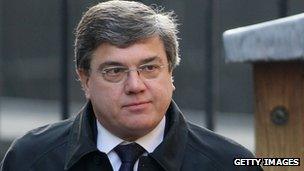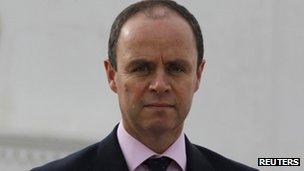Leveson's police grilling only the beginning
- Published
- comments
Let's not beat about the bush. No journalist in their right mind turns down a drink with a top contact.
It's part of the business. It builds contacts - and contacts lead to stories.
But the latest Leveson Inquiry evidence, suggesting that some Metropolitan Police chiefs dabbled in a champagne lifestyle with tabloid hacks, won't help the force rebut the charge that it was too close to News International.
The inquiry has moved into its next phase , externalwhich is looking at the relationship between the police and the press.
We've had weeks of evidence of alleged tabloid excesses and something of an attempted fightback from the papers and their friends in politics.
But this second phase may ultimately prove to be the most important because Lord Leveson has to decide whether the relationship between certain cops and reporters has been ethical - even if it can't be expected to be entirely transparent.
Police reputation
The question for the inquiry is quite simple: Was the relationship between the Metropolitan Police and News International in particular at best too close and at worst corrupt? And if it was inappropriate, does that explain a failure to investigate hacking?

Peter Clarke has defended the police's decision not to delve deeper into the activities of reporters
The hacking allegations surfaced amid the massive counter-terrorism operations of 2006. Clive Goodman, the only News of the World reporter jailed for hacking, was arrested in the middle of a hugely successful investigation into a plot to bring down transatlantic airliners.
Peter Clarke, the then national co-ordinator of counter-terrorism operations, has repeatedly defended decisions not to delve deeper into the activities of reporters.
On Thursday he told the inquiry: "Invasions of privacy are odious, obviously. They can be extraordinarily distressing and illegal but they don't kill you. Terrorists do."
Lord Leveson has signalled that he clearly understands that reasoning. So the real question is why did the police not investigate again in 2009-2010?
This is the point upon which the Metropolitan Police's reputation now turns.
Champagne policing?
John Yates, the assistant commissioner who quit last year, faced three hours of very tough questioning yesterday about his drinks and meals with News International hacks.
Mr Yates, highly respected by his peers, is under attack because it was his decision not to reopen the hacking inquiry after the Guardian newspaper's investigation showed the News of the World's "rogue reporter" defence was rubbish.
The worst moment for him came when he had to comment on an internal NoW email in which a news desk editor asks a star reporter to "call in those bottles of champagne" by getting Mr Yates to spill the beans about a terrorism plot.
"It's a phrase," said Mr Yates. "And I think it's slightly unfair that it's put to me in that way, and I've said I put a completely different spin on it to you. There may well have been the odd occasion, yes, when a bottle was being shared with several people, but nothing in the sense that you're suggesting."

John Yates, former Met Police assistant commissioner, is now working in Bahrain
While all of this was going on, Lord Prescott was on Twitter,, external angrily commenting on the evidence of Mr Yates and his former colleague Andy Hayman: "Yates spent 1 year investigating Cash 4 Honours & found nothing. Spent 6 hours reviewing phone hacking & missed EVERYTHING"
Leveson is going to hear from more key and former Met figures who will be asked whether they agree that the relationship with the press went wrong.
One of next week's star witnesses is Lord Blair who quit as commissioner four years ago in circumstances completely unrelated to hacking.
We heard a sneak preview of his evidence when earlier this week Robert Jay QC, counsel to the inquiry, read out part of the former Met chief's witness statement.
In the document, Lord Blair says: "I believe that where the problem may have become significant is that a very small number of relatively senior officers increasingly became too close to journalists, not I believe for financial gain but for the enhancement of their reputation and for the sheer enjoyment of being in a position to share and divulge confidences."
John Yates and his former colleague Andy Hayman denied on Thursday that there was anything wrong in their relationships with the press or News International.
But the question of the Met's general approach to newspapers will keep coming back as the inquiry looks at whether, in the words of Robert Jay, there was an "arguably over-cosy relationship".
So this week's evidence has really only been the opening shots in what is going to be a very uncomfortable time for Britain's top force.